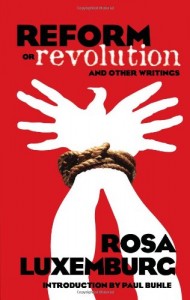
Rosa Luxemburg
4.0 out of 5 stars Tedious, Some Valuable Provocative Original Thinking, March 6, 2015
I bought this book along with On Marx: Revolutionary and Utopian (Liveright Classics) at Powell's in Portland, one of the truly great bookstores in the USA along with the Tattered Cover in Denver (which is a tenth the size of Powell's). I bought it largely because of its focus on the general strike versus the partial strike as a tactic that might or might not be possible depending on the country and where it is in its economic degeneration.
Although I received a very good education in political thought from Charles Bednar at Muhlenberg, I confess that it is only now at 63 that I have realized that most of what our government, media, think tanks, and even universities offer in the way of commentary on “political economy” is ideological crap — they do not do their homework, they really have no clue, and they get away with it because everyone else has no clue either.
Peter Linebaugh's Stop, Thief!: The Commons, Enclosures, and Resistance (Spectre) is what forced me to reconsider Marx's critique of capitalism and I recommend that 2014 publication to anyone who wishes to think critically about capitalism today, along with the following:
Occupy the Economy: Challenging Capitalism (City Lights Open Media)
Griftopia: A Story of Bankers, Politicians, and the Most Audacious Power Grab in American History
Confessions of an Economic Hit Man
No Logo: 10th Anniversary Edition with a New Introduction by the Author
Liar's Poker (25th Anniversary Edition): Rising Through the Wreckage on Wall Street (25th Anniversary Edition)
In short, the rest of us have caught up with Marx. Predatory Capitalism is toxic and unsustainable. While Communism (along with Socialism and Facism) have proven to be just as bad as predatory or plutocratic capitalism, Marx, as an intellect and economists, and others such as the author of this book Rosa Luxemburg, are now recognized by a growing body as having been over a century ahead of their time.




